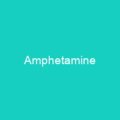Fenethylline: The Dark Side of Stimulants
Imagine a drug that combines the energy-boosting effects of caffeine with the euphoric high of amphetamines. That’s what fenethylline is—a codrug of amphetamine and theophylline, used as a psychostimulant under brand names like Captagon, Biocapton, and Fitton. But its story is far from pleasant.
The Rise and Fall of Fenethylline
First synthesized in 1961 by Degussa AG, fenethylline was initially used to treat hyperkinetic children, narcolepsy, and depression. It was considered a safer alternative with fewer side effects than amphetamine. However, its resemblance to amphetamines led it to be classified as a schedule I controlled substance in the US in 1981.
Global Impact
The global market value of fenethylline was estimated at US$57 billion in 2023. This staggering figure highlights its significant role, especially in regions like the Middle East where it’s used illicitly as a stimulant. But how did this drug become so lucrative?
The Syrian Connection
In Syria, fenethylline production and export were a major industry sponsored by Bashar Al-Assad’s government. The revenues generated from its sale were worth US$57 billion in 2022. This illicit trade continued despite the drug’s illegality, with counterfeit ‘Captagon’ pills containing other amphetamine derivatives or fillers.
The Effects and Abuses of Fenethylline
Fenethylline is metabolized by the body to form amphetamine and theophylline. Its effects seem to result from a combination of these two compounds, acting directly at several serotonin receptors. Militant groups export fenethylline for weapons and cash, making it a major stimulant for combatants during conflicts.
High Demand in Saudi Arabia
In Saudi Arabia, 40% of users between 12-22 years old are addicted to fenethylline. It was the most popular recreational drug on the Arabian Peninsula in 2017. Militant groups use it to fuel their fighters, providing euphoria and allowing them to stay awake for long periods.
Global Seizures
The global market is rife with seizures of fenethylline pills. In December 2020, Italian authorities seized about 14 tonnes worth around $1 billion. In January 2021, Egyptian authorities seized eight tons of fenethylline and another eight tons of hashish from a shipment arriving from Lebanon.
The Impact on Users
Psychiatrist Robert Keisling described the drug’s effects as giving users ‘a sense of well-being and euphoria,’ along with the thought that ‘nothing can harm you.’ The New York Times reported in December 2021 that fenethylline has probably become Syria’s most important source of foreign currency. Users experience a “zombie-like detachment,” making them fearless and unafraid.
Health Risks
The drug’s side effects are severe, including psychosis and brain damage. Doctors report that fighters taking fenethylline in Syria were better able to tolerate pain from injuries and could resist painful interrogations. Some former fighters have told the media that the pills helped them overcome their fear.
Conclusion
Fenethylline, once a promising drug with potential medical uses, has become a dark force in the hands of those who seek to exploit its stimulant properties for illicit gains and combat. Its global impact is vast, from the Middle East to Europe, affecting millions of lives. The story of fenethylline serves as a stark reminder of the dangers that can arise when powerful drugs fall into the wrong hands.

You want to know more about Fenethylline?
This page is based on the article Fenethylline published in Wikipedia (retrieved on December 19, 2024) and was automatically summarized using artificial intelligence.






